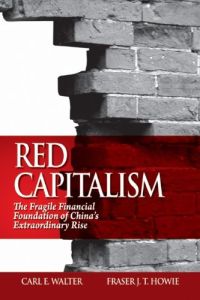Join getAbstract to access the summary!

Join getAbstract to access the summary!
Carl E. Walter and Fraser J.T. Howie
Red Capitalism
The Fragile Financial Foundation of China's Extraordinary Rise
Wiley, 2011
What's inside?
Get a behind-the-scenes look at how China’s financial system really works.
Recommendation
This insider’s report on China’s version of capitalism tells a revealing story about an economy that is poised to become the world’s largest. Asia banking experts Carl E. Walter and Fraser J.T. Howie expose the interconnections of a financial system dominated by the Communist Party; the conflicts among ruling families, corporate executives and technocrats – each vying for political and personal gain; and the challenges opaque, state-run companies present to Western investors. The authors delve into the byzantine, often clandestine machinations behind the modern and sophisticated screen China presents to the rest of the world. The book provides a detailed account of major players, agencies and policies, as well as an advanced-level financial analysis of the banking and capital market sectors. The book’s most interesting points sometimes bog down in historical details, but patient readers reap rewards. getAbstract recommends this extraordinary behind-the-scenes look to those who want to know what’s really driving China’s dazzling growth. Surprisingly, this is a story most people do not know.
Summary
About the Authors
Carl E. Walter worked in China’s financial sector for 20 years; he held a senior position in China’s first joint venture investment bank. Fraser J.T. Howie is managing director of a brokerage firm in Singapore.



















Comment on this summary